7013IBA: Restricting Trade to Reduce Greenhouse Gas Emissions
VerifiedAdded on 2022/09/01
|5
|804
|14
Essay
AI Summary
This essay examines the relationship between international trade and greenhouse gas emissions, arguing for the implementation of trade restrictions to mitigate climate change. It begins with an introduction to the issue, followed by a review of key literature highlighting the impact of transportation and industrial activities associated with trade on emissions. The essay then presents arguments supported by data and examples, emphasizing that international transport contributes significantly to greenhouse gas emissions. The conclusion reiterates the need for trade restrictions, along with environmental policies. The essay recommends adopting effective institutional frameworks and environmental policies at various levels, referencing the World Trade Organization's environmental efforts. The essay concludes with a list of cited references.
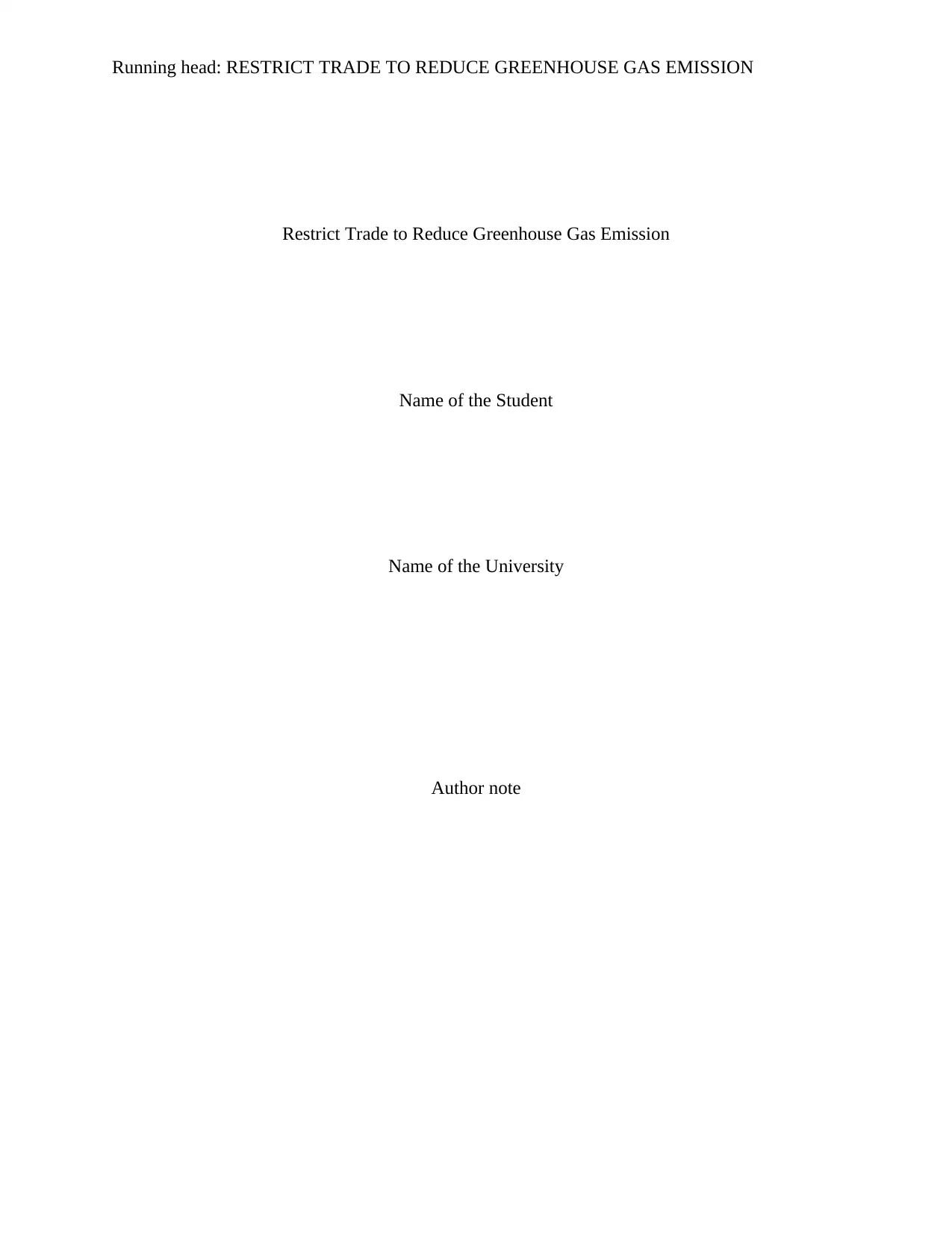
Running head: RESTRICT TRADE TO REDUCE GREENHOUSE GAS EMISSION
Restrict Trade to Reduce Greenhouse Gas Emission
Name of the Student
Name of the University
Author note
Restrict Trade to Reduce Greenhouse Gas Emission
Name of the Student
Name of the University
Author note
Paraphrase This Document
Need a fresh take? Get an instant paraphrase of this document with our AI Paraphraser
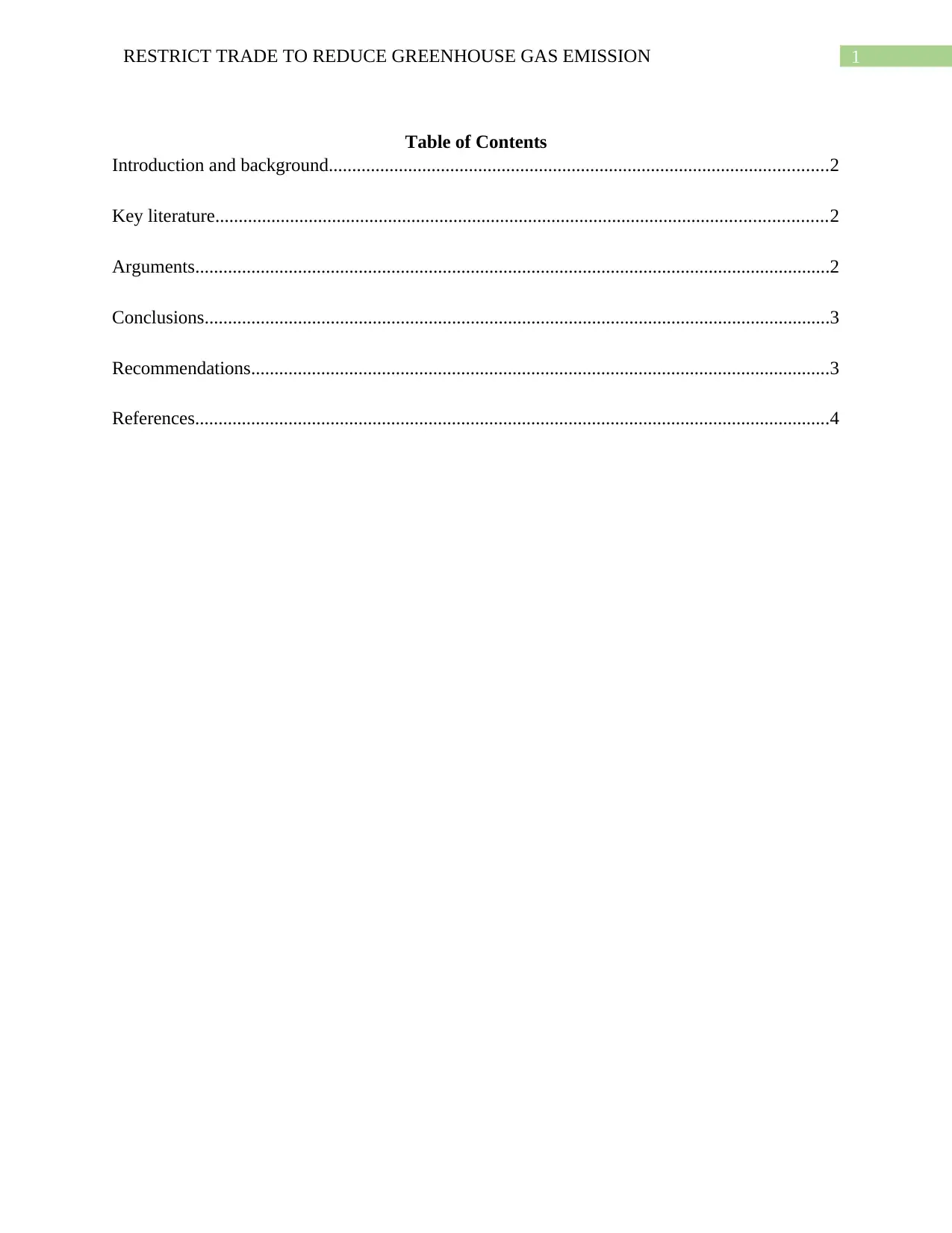
1RESTRICT TRADE TO REDUCE GREENHOUSE GAS EMISSION
Table of Contents
Introduction and background...........................................................................................................2
Key literature...................................................................................................................................2
Arguments........................................................................................................................................2
Conclusions......................................................................................................................................3
Recommendations............................................................................................................................3
References........................................................................................................................................4
Table of Contents
Introduction and background...........................................................................................................2
Key literature...................................................................................................................................2
Arguments........................................................................................................................................2
Conclusions......................................................................................................................................3
Recommendations............................................................................................................................3
References........................................................................................................................................4
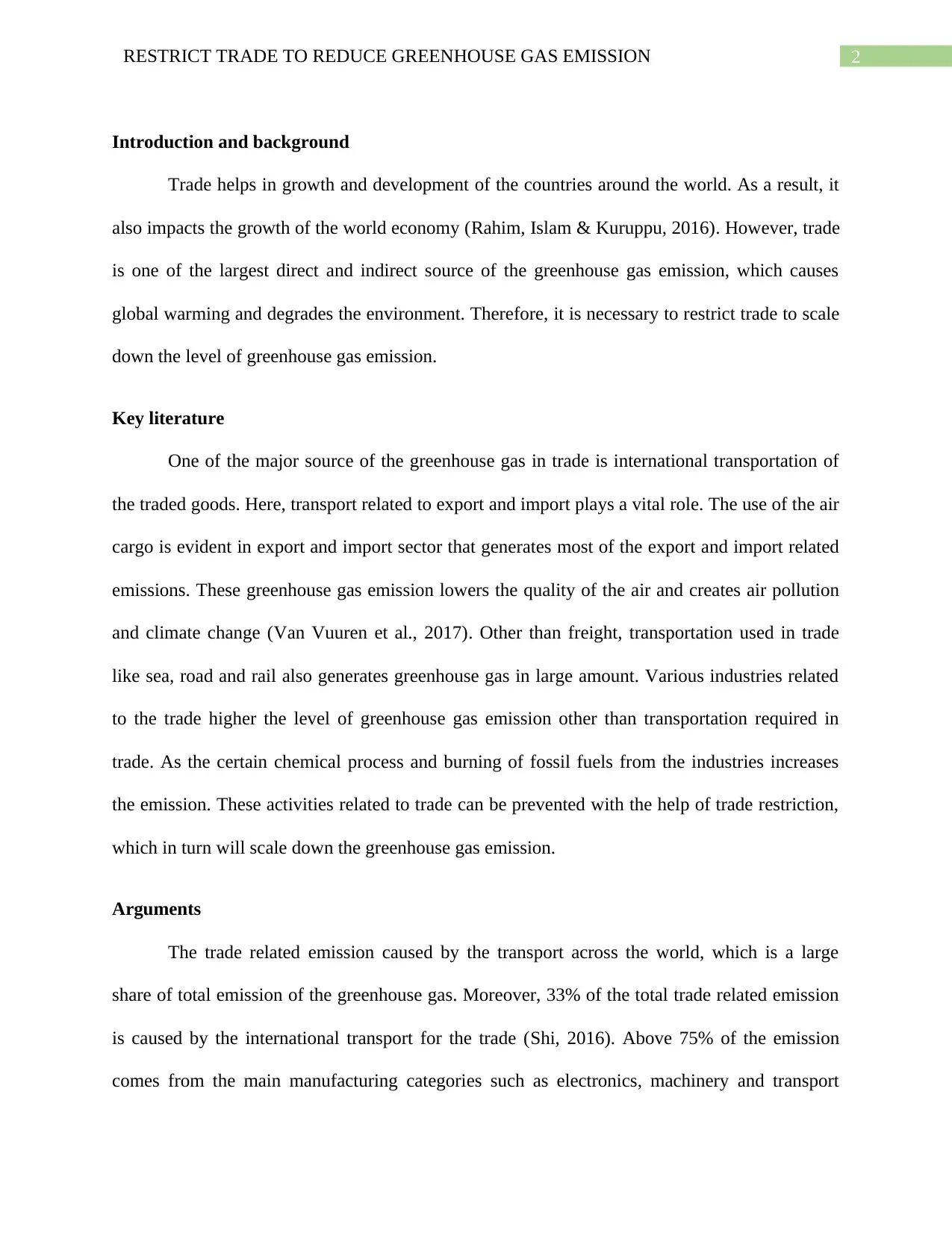
2RESTRICT TRADE TO REDUCE GREENHOUSE GAS EMISSION
Introduction and background
Trade helps in growth and development of the countries around the world. As a result, it
also impacts the growth of the world economy (Rahim, Islam & Kuruppu, 2016). However, trade
is one of the largest direct and indirect source of the greenhouse gas emission, which causes
global warming and degrades the environment. Therefore, it is necessary to restrict trade to scale
down the level of greenhouse gas emission.
Key literature
One of the major source of the greenhouse gas in trade is international transportation of
the traded goods. Here, transport related to export and import plays a vital role. The use of the air
cargo is evident in export and import sector that generates most of the export and import related
emissions. These greenhouse gas emission lowers the quality of the air and creates air pollution
and climate change (Van Vuuren et al., 2017). Other than freight, transportation used in trade
like sea, road and rail also generates greenhouse gas in large amount. Various industries related
to the trade higher the level of greenhouse gas emission other than transportation required in
trade. As the certain chemical process and burning of fossil fuels from the industries increases
the emission. These activities related to trade can be prevented with the help of trade restriction,
which in turn will scale down the greenhouse gas emission.
Arguments
The trade related emission caused by the transport across the world, which is a large
share of total emission of the greenhouse gas. Moreover, 33% of the total trade related emission
is caused by the international transport for the trade (Shi, 2016). Above 75% of the emission
comes from the main manufacturing categories such as electronics, machinery and transport
Introduction and background
Trade helps in growth and development of the countries around the world. As a result, it
also impacts the growth of the world economy (Rahim, Islam & Kuruppu, 2016). However, trade
is one of the largest direct and indirect source of the greenhouse gas emission, which causes
global warming and degrades the environment. Therefore, it is necessary to restrict trade to scale
down the level of greenhouse gas emission.
Key literature
One of the major source of the greenhouse gas in trade is international transportation of
the traded goods. Here, transport related to export and import plays a vital role. The use of the air
cargo is evident in export and import sector that generates most of the export and import related
emissions. These greenhouse gas emission lowers the quality of the air and creates air pollution
and climate change (Van Vuuren et al., 2017). Other than freight, transportation used in trade
like sea, road and rail also generates greenhouse gas in large amount. Various industries related
to the trade higher the level of greenhouse gas emission other than transportation required in
trade. As the certain chemical process and burning of fossil fuels from the industries increases
the emission. These activities related to trade can be prevented with the help of trade restriction,
which in turn will scale down the greenhouse gas emission.
Arguments
The trade related emission caused by the transport across the world, which is a large
share of total emission of the greenhouse gas. Moreover, 33% of the total trade related emission
is caused by the international transport for the trade (Shi, 2016). Above 75% of the emission
comes from the main manufacturing categories such as electronics, machinery and transport
⊘ This is a preview!⊘
Do you want full access?
Subscribe today to unlock all pages.

Trusted by 1+ million students worldwide
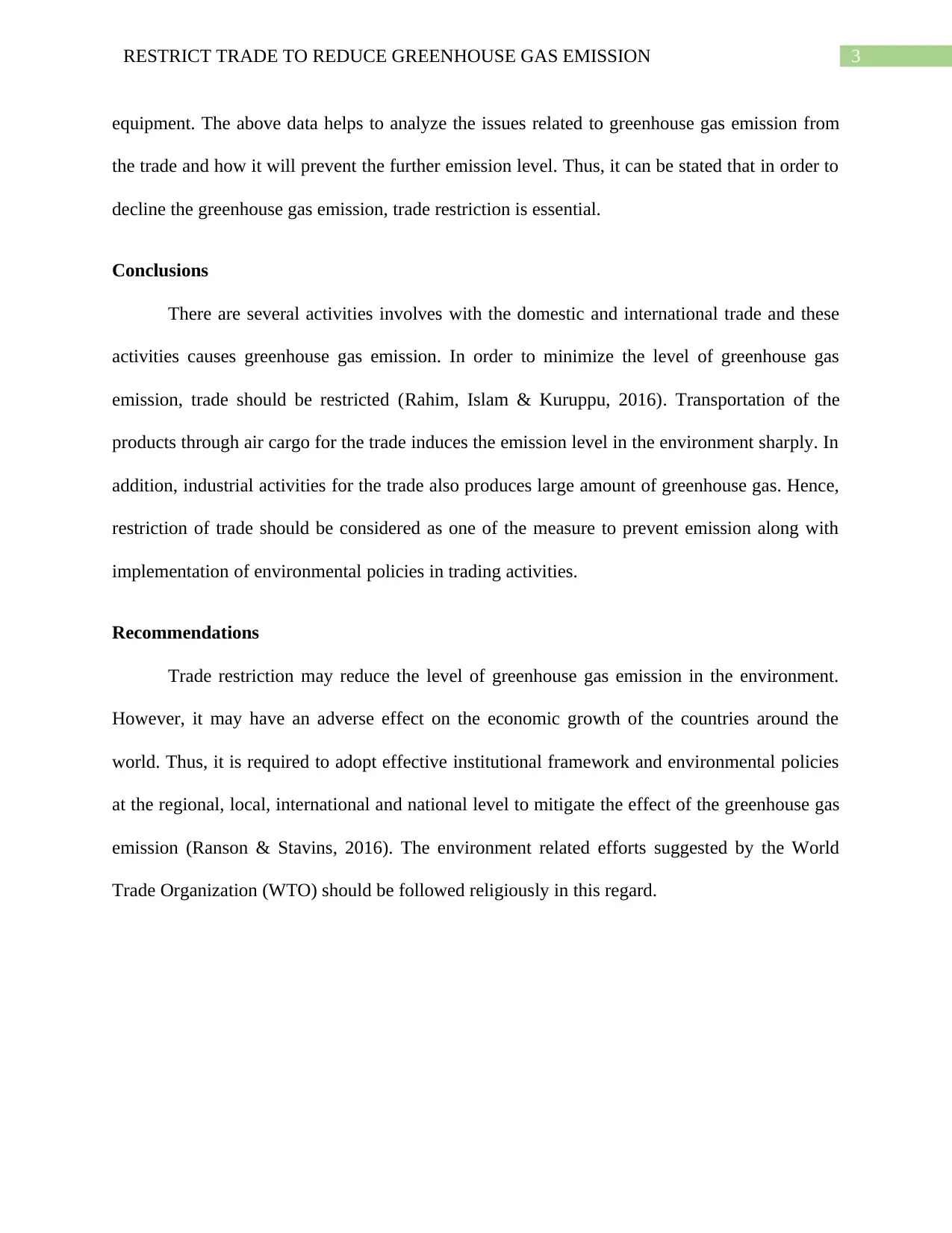
3RESTRICT TRADE TO REDUCE GREENHOUSE GAS EMISSION
equipment. The above data helps to analyze the issues related to greenhouse gas emission from
the trade and how it will prevent the further emission level. Thus, it can be stated that in order to
decline the greenhouse gas emission, trade restriction is essential.
Conclusions
There are several activities involves with the domestic and international trade and these
activities causes greenhouse gas emission. In order to minimize the level of greenhouse gas
emission, trade should be restricted (Rahim, Islam & Kuruppu, 2016). Transportation of the
products through air cargo for the trade induces the emission level in the environment sharply. In
addition, industrial activities for the trade also produces large amount of greenhouse gas. Hence,
restriction of trade should be considered as one of the measure to prevent emission along with
implementation of environmental policies in trading activities.
Recommendations
Trade restriction may reduce the level of greenhouse gas emission in the environment.
However, it may have an adverse effect on the economic growth of the countries around the
world. Thus, it is required to adopt effective institutional framework and environmental policies
at the regional, local, international and national level to mitigate the effect of the greenhouse gas
emission (Ranson & Stavins, 2016). The environment related efforts suggested by the World
Trade Organization (WTO) should be followed religiously in this regard.
equipment. The above data helps to analyze the issues related to greenhouse gas emission from
the trade and how it will prevent the further emission level. Thus, it can be stated that in order to
decline the greenhouse gas emission, trade restriction is essential.
Conclusions
There are several activities involves with the domestic and international trade and these
activities causes greenhouse gas emission. In order to minimize the level of greenhouse gas
emission, trade should be restricted (Rahim, Islam & Kuruppu, 2016). Transportation of the
products through air cargo for the trade induces the emission level in the environment sharply. In
addition, industrial activities for the trade also produces large amount of greenhouse gas. Hence,
restriction of trade should be considered as one of the measure to prevent emission along with
implementation of environmental policies in trading activities.
Recommendations
Trade restriction may reduce the level of greenhouse gas emission in the environment.
However, it may have an adverse effect on the economic growth of the countries around the
world. Thus, it is required to adopt effective institutional framework and environmental policies
at the regional, local, international and national level to mitigate the effect of the greenhouse gas
emission (Ranson & Stavins, 2016). The environment related efforts suggested by the World
Trade Organization (WTO) should be followed religiously in this regard.
Paraphrase This Document
Need a fresh take? Get an instant paraphrase of this document with our AI Paraphraser
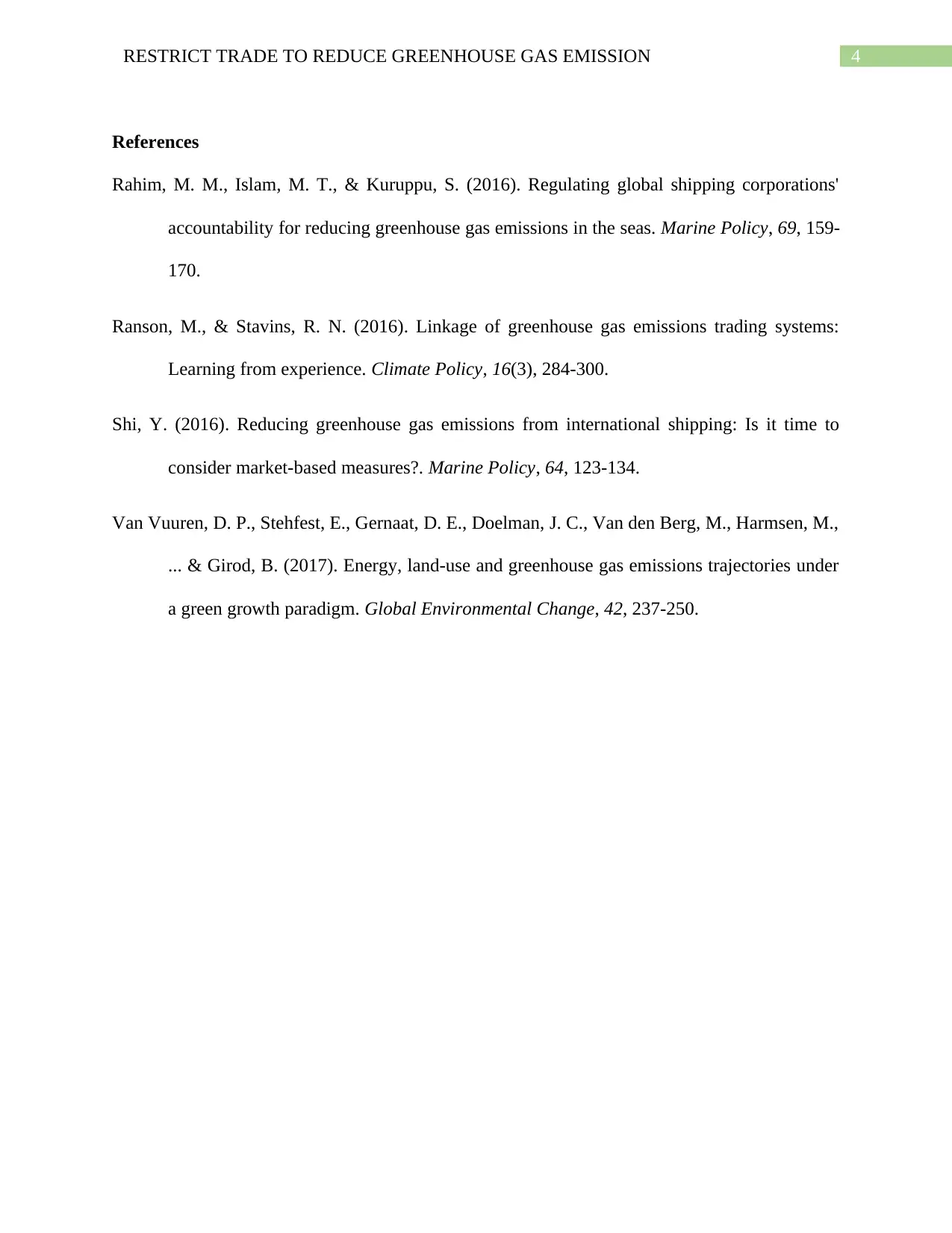
4RESTRICT TRADE TO REDUCE GREENHOUSE GAS EMISSION
References
Rahim, M. M., Islam, M. T., & Kuruppu, S. (2016). Regulating global shipping corporations'
accountability for reducing greenhouse gas emissions in the seas. Marine Policy, 69, 159-
170.
Ranson, M., & Stavins, R. N. (2016). Linkage of greenhouse gas emissions trading systems:
Learning from experience. Climate Policy, 16(3), 284-300.
Shi, Y. (2016). Reducing greenhouse gas emissions from international shipping: Is it time to
consider market-based measures?. Marine Policy, 64, 123-134.
Van Vuuren, D. P., Stehfest, E., Gernaat, D. E., Doelman, J. C., Van den Berg, M., Harmsen, M.,
... & Girod, B. (2017). Energy, land-use and greenhouse gas emissions trajectories under
a green growth paradigm. Global Environmental Change, 42, 237-250.
References
Rahim, M. M., Islam, M. T., & Kuruppu, S. (2016). Regulating global shipping corporations'
accountability for reducing greenhouse gas emissions in the seas. Marine Policy, 69, 159-
170.
Ranson, M., & Stavins, R. N. (2016). Linkage of greenhouse gas emissions trading systems:
Learning from experience. Climate Policy, 16(3), 284-300.
Shi, Y. (2016). Reducing greenhouse gas emissions from international shipping: Is it time to
consider market-based measures?. Marine Policy, 64, 123-134.
Van Vuuren, D. P., Stehfest, E., Gernaat, D. E., Doelman, J. C., Van den Berg, M., Harmsen, M.,
... & Girod, B. (2017). Energy, land-use and greenhouse gas emissions trajectories under
a green growth paradigm. Global Environmental Change, 42, 237-250.
1 out of 5
Related Documents
Your All-in-One AI-Powered Toolkit for Academic Success.
+13062052269
info@desklib.com
Available 24*7 on WhatsApp / Email
![[object Object]](/_next/static/media/star-bottom.7253800d.svg)
Unlock your academic potential
Copyright © 2020–2026 A2Z Services. All Rights Reserved. Developed and managed by ZUCOL.





